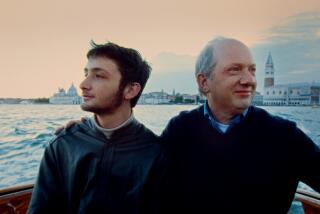Tape-Recording Relatives’ Saga : Oral History--Finding Gems of a Family’s Past
- Share via
Parents and other older relatives can be a treasure trove of the past, but, without a record, their experiences usually die with them.
This does not have to be the case, according to Judd Grenier, professor of history at California State University, Dominguez Hills, in Carson, who is an expert on oral histories and how to conduct them.
“It’s almost like the old oral traditions of the primitive tribe,” he said. “It’s the responsibility of the middle generation to take the experiences of their parents and transmit them to their children.”
Nowadays, he said, it is not necessary to memorize lengthy family sagas to accomplish this goal; a tape recorder will do the job.
More Than Pushing a Button
But there is more to doing an oral history than just pressing the recording button, said Grenier, who offers suggestions on how to successfully record the oral histories of family members.
Access and familiarity are the advantages of interviewing your parents, he said. They may open up to you more than to a stranger, he said. However, that very informality can cause problems, he noted.
“Parents tend to be condescending to their children and casual,” he said. “They will not say things they think you already know. So the best situation is to interview someone you know, but who is not your parent, such as an aunt or a grandmother, to get away from the parent-child relationship.”
Before you schedule the interview, he said, write down what you want to discuss and do a non-taped talk with the person, taking notes, to gain an overview of that person’s life. Using the notes, he said, you can develop a list of topics to ask about.
There are three general subject areas to tackle in such an interview, Grenier said. First, there are routine personal items, he said, such as where they were born, who their parents were, where they went to school and where they worked.
Common Experiences
Then, he said, there are common-denominator experiences. For those born in 1910, for example, the interviewer should ask about their recollections of such events as World Wars I and II, the introduction of the automobile, the Jazz Age, Prohibition, the Depression, the Presidents they lived under and where they were during such pivotal occurrences as the bombing of Pearl Harbor, Grenier said.
The third category of questions concerns what is special about that particular person, Grenier said.
“Blend the three types of questions together in a topical outline,” he said, “and show the outline to the person you will interview, who can then make suggestions on what else to cover. But don’t prepare specific questions.
“Then you are entrapped by the questions. You will get stilted, formal replies. You have to be prepared to abandon the interview outline any time something exciting comes up. The outline is just to get you going.”
Before starting the interview, become familiar with your recording equipment and make sure it is working, Grenier said. If possible, he said, sit across a table from the subject and place the microphone in the middle so the volume and pitch levels will remain constant.
‘Hide the Tape Recorder’
“Try to disguise or hide the tape recorder,” he said. “People talk to the tape recorder as if it were a camera instead of to the interviewer.”
The interview should take place in an informal, relaxed setting with no other people or distractions such as the telephone in the room, he said.
In addition to taping, the interviewer should take notes. This will give you accurate spellings of names and places, Grenier said.
“Don’t ask more than one question at a time,” he said. “Don’t ask long questions, which makes the interview more stilted.” And avoid questions that can be answered by simple yes or no, he said, since many people will then not elaborate.
“Use the old ‘who, what, where, why and how.’ Those can’t be answered yes or no,” he said.
The professor also advises people not to prolong the interview for more than an hour because the interviewee tends to tire. “But a lot of elderly people can talk hours upon hours,” he said. “They don’t wear out. Break the interview up into blocks. It gives you time to listen to the first hour to follow up in the second hour.”
After the interview is over, more work lies ahead, Grenier said.
Transcript Recommended
“If preserving a historic record for your children, they may want to hear their grandfather’s words, nuances, laughter,” he said. “The maximum technique of preserving the interview is to do a full transcription to keep along with the tape.”
Once you have got the hang of oral histories, Grenier said, you may discover that history is more than just doings of the famous, that everyday people also play valuable roles in history.
“An interview with an individual is more than just an individual story. It’s very often the story of a whole group of people who have undergone similar changes and developments in their lives,” Grenier said. “If you interview one person, you may find out if they were part of a wave of immigration from Europe to America or from the East Coast to the West Coast.”
Saving the past in the form of oral histories will also provide a link from one generation to the next, he said.
“You do oral histories for the same reason Alex Haley searched for his roots in Africa,” Grenier said. “It provides a sense of belonging, of identity. It gives you a place in space and time.”
More to Read
Sign up for Essential California
The most important California stories and recommendations in your inbox every morning.
You may occasionally receive promotional content from the Los Angeles Times.













